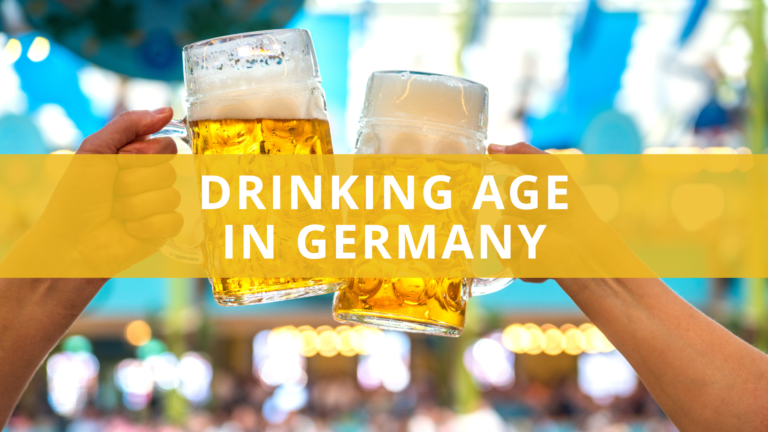What Is the Drinking Age in Germany? Alcohol Laws Explained
As someone who loves to travel and experience new cultures, I’ve always been curious about the drinking laws in different countries. Recently, I found myself planning a trip to Germany and realized that I didn’t know much about the drinking laws there. That’s why I decided to do some research and put together this guide to drinking laws in Germany. I hope you find it helpful!
Drinking Age in Germany
In Germany, the legal drinking age is 16 for beer and wine, and 18 for spirits. This means that if you’re 16 or 17 years old, you’re legally allowed to drink beer and wine in Germany, but not spirits. If you’re 18 or older, you can legally drink any type of alcohol.
One interesting thing to note is that while the legal drinking age in Germany is relatively low compared to other countries, it’s not uncommon for parents to introduce their children to alcohol at a younger age. This is seen as a way to teach children to drink responsibly and avoid binge drinking later in life.
Purchase Laws in Germany
The legal age for purchasing alcohol in Germany is also 16 for beer and wine, and 18 for spirits. Alcohol can be purchased at supermarkets, liquor stores, and bars, among other places. However, there are restrictions on the sale of alcohol in Germany. For example, stores are not allowed to sell alcohol between 10pm and 6am, and they are required to check customers’ IDs if they appear to be under the legal age.
If you’re a tourist in Germany, it’s important to note that you may be asked to show your passport or other form of identification when purchasing alcohol, even if you’re over the legal age. This is because some stores and bars may not be familiar with foreign IDs.
Drinking Culture in Germany
Drinking plays a significant role in German culture, and there are many different types of alcohol that are popular in the country. Beer is perhaps the most well-known, and Germany is famous for its many different types of beer, including lagers, ales, and wheat beers. Wine is also popular, particularly in the southwestern region of Germany, where many vineyards are located. Schnapps, a type of distilled spirit, is another popular choice.
When drinking in Germany, it’s important to observe the local etiquette. For example, it’s customary to toast before taking the first sip of a drink, and there are many different toasting traditions depending on the occasion. It’s also common to sing drinking songs, particularly when drinking beer.
Driving Laws in Germany
If you’re planning to drive in Germany, it’s important to be aware of the legal blood alcohol content (BAC) limit, which is 0.5%. This is lower than the BAC limit in many other countries, so it’s important to be cautious when drinking and driving in Germany.
The penalties for drunk driving in Germany can be severe. Fines can range from a few hundred to several thousand euros, and license suspension and imprisonment are also possible. If you’re caught driving under the influence in Germany, it could have serious consequences for your trip and your future travel plans.
To stay safe while driving in Germany, it’s a good idea to use public transportation or a designated driver if you plan on drinking alcohol.
Frequently Asked Questions
Here are some frequently asked questions related to the drinking age in Germany:
What is the legal drinking age for tourists in Germany?
The legal drinking age in Germany is the same for tourists as it is for locals. If you’re 16 or 17 years old, you can legally drink beer and wine, but not spirits. If you’re 18 or older, you can legally drink any type of alcohol.
Can I drink alcohol in public in Germany?
Drinking alcohol in public is generally allowed in Germany, but there are some restrictions. For example, it’s illegal to drink alcohol in some public places, such as schools and hospitals. Additionally, some cities and towns may have their own rules and regulations regarding public drinking, so it’s important to be aware of local laws.
What is the legal BAC limit for driving in Germany?
The legal blood alcohol content (BAC) limit for driving in Germany is 0.5%. This is lower than the BAC limit in many other countries, so it’s important to be cautious when drinking and driving in Germany.
Can I buy alcohol in Germany on Sundays and holidays?
In general, stores are not allowed to sell alcohol on Sundays and certain holidays in Germany. However, there are some exceptions to this rule, such as in tourist areas and at airports. It’s always a good idea to check local regulations before making a purchase.
Are there any other drinking laws in Germany that I should be aware of?
There are a few other drinking laws in Germany that are worth noting. For example, it’s illegal to serve alcohol to someone who is visibly intoxicated, and there are restrictions on advertising alcohol. Additionally, some cities and towns may have their own rules and regulations regarding drinking in public places.
Conclusion to the Drinking Age in Germany
Germany has a rich and diverse drinking culture, and it’s important to be aware of the country’s drinking laws and customs when visiting. Whether you’re enjoying a glass of beer at a local pub or driving through the countryside, it’s essential to be responsible and respect the local laws and traditions. By following these guidelines, you can ensure a safe and enjoyable experience while exploring all that Germany has to offer.
- What to Wear in Cancun by Month & Activity (And Not!) - March 13, 2023
- What to Wear in New York by Month & Activity (And Not!) - March 13, 2023
- What to Wear in Morocco by Month & Activity (And Not!) - March 13, 2023

